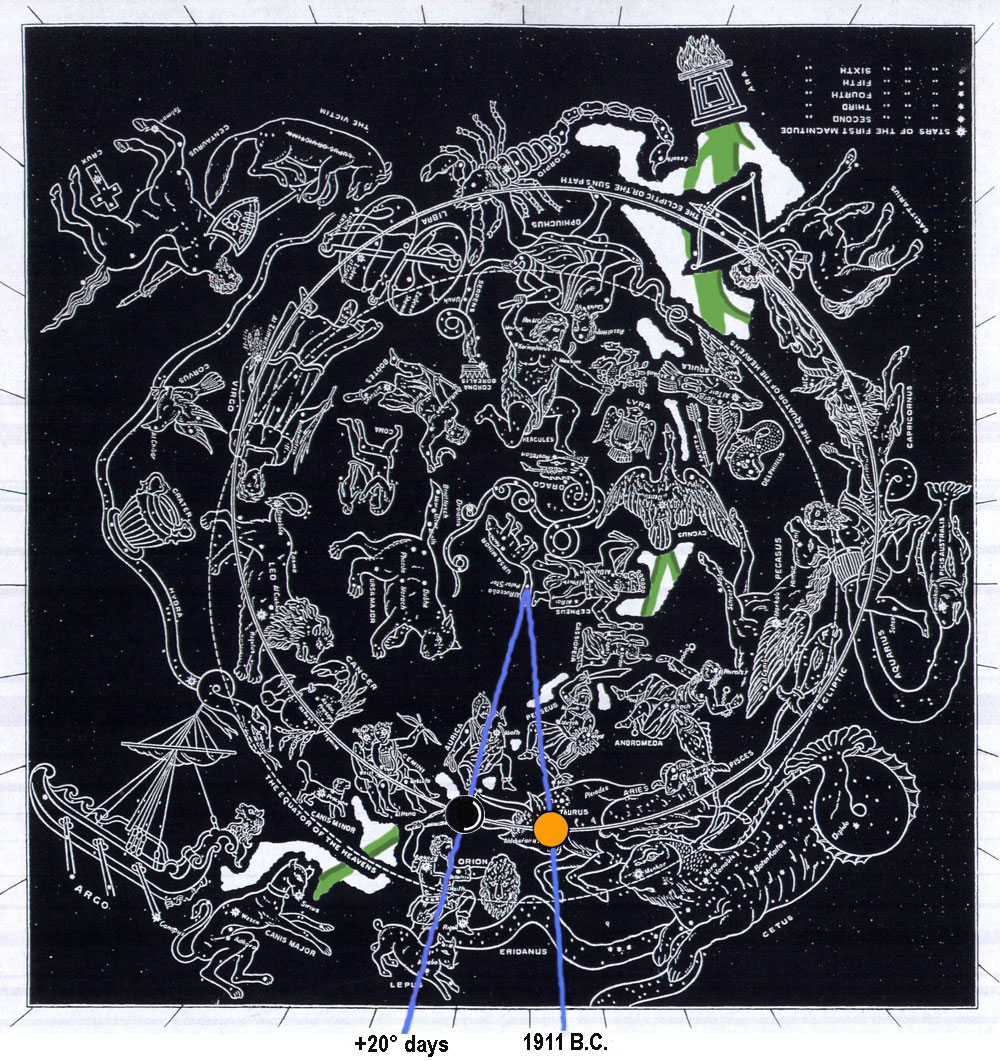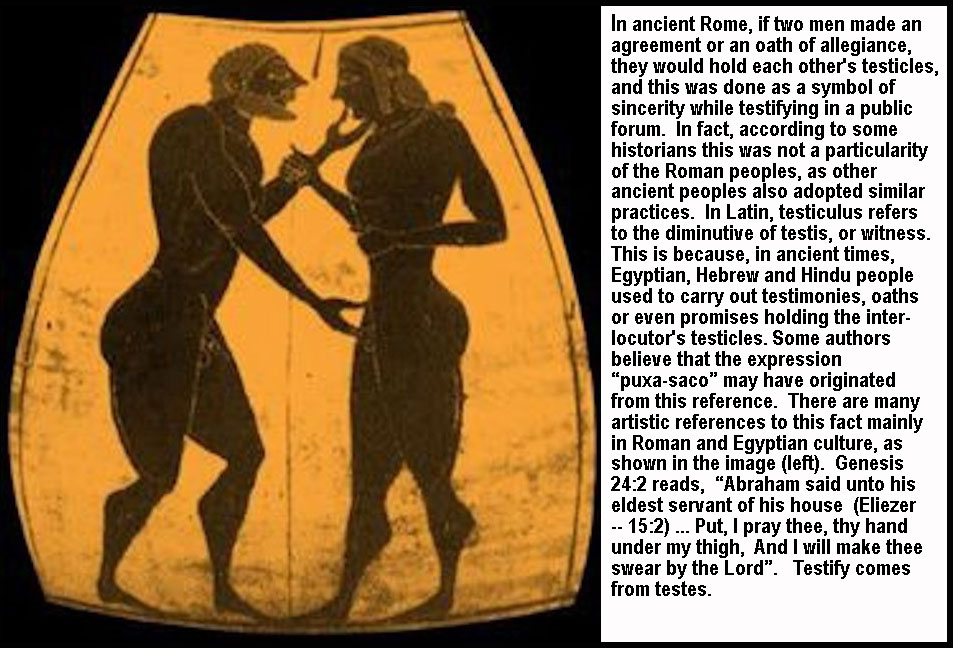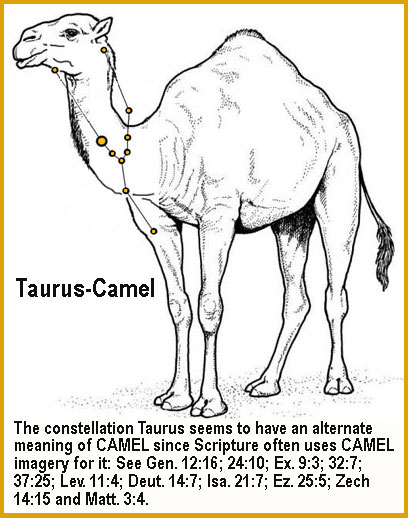
Genesis chapter 24 Star Chart: Since "Isaac was forty years old when he took Rebekah to wife" (25:20), this chapter can be dated as 1911 B.C. Abraham was 140 by this time since "Abraham was an hundred years old, when his son Isaac was born unto him" (Gen. 21:5). Clockwise from when Abraham's "servant took TEN (Taurus) camels of the camels of his master, and departed ... and he arose, and went to Mesopotamia, unto the city of Nahor" (24:10) "And they did eat and drink, he and the men that were with him, and tarried all night; and they rose up in the morning, and he said, Send me away unto my master" (24:54) till "Isaac (Orion) went out to meditate in the field at the eventide: and he lifted up his eyes, and saw, and, behold, the (TEN) (Taurus) camels were coming" (24:63) is 20° days in 1911 B.C. because that is the only way the moon can pass through the "camel" Taurus constellation TEN times going and TEN times coming.
|
|---|
Choose a Kindred Wife For My Son
-- Not a Canaanite
24:1 And Abraham (Auriga) was old, and well stricken in age: and the Lord had blessed Abraham in all things.
2 And Abraham (Auriga) (blue radius) said unto his eldest servant (Orion) of his house, that ruled over all that he had, Put, I pray thee, thy hand under my thigh (on the lunar circumcised part):
Eliezer (Genesis 15:2),
3 And I will make thee swear by the Lord, the God of heaven, and the God of the earth, that thou shalt not take a wife unto my son of the daughters of the Canaanites, among whom I dwell:
Testify = testes. The dread of the marriage of an Israelite with a Canaanite which is found here, is also expressed in Genesis 26:34-35, Genesis 27:46; Exodus 34:16; Deuteronomy 7:3; Ezra 9:2.
4 But thou shalt go unto my country, and to my kindred, and take a wife unto my son Isaac.
“Marriage between cousins has been and still is particularly common in the East (cp. Genesis 24:4; Genesis 29:19; 1 Kings 14:31; 1 Kings 15:2), and the tie between them is closer and more sacred than that between an ordinary couple”
5 And the servant (Orion) (blue radius) said unto him, Peradventure the woman will not be willing to follow me unto this land: must I needs bring thy son again unto the land from whence thou camest?
6 And Abraham (Auriga) (blue radius) said unto him, Beware thou that thou bring not my son thither again.
7 The Lord God of heaven, which took me from my father's house, and from the land of my kindred, and which spake unto me, and that sware unto me, saying, Unto thy seed will I give this land; he shall send his angel before thee, and thou shalt take a wife unto my son from thence.
8 And if the woman will not be willing to follow thee, then thou shalt be clear from this my oath: only bring not my son thither again.
9 And the servant (Orion) put his hand under the thigh (on the lunar circumcised part) of Abraham his master, and sware to him concerning that matter.
Testify = testes

10 And the servant (Orion) took ten camels (ten revolutions through Taurus) of the camels of his master (Auriga), and departed; for all the goods of his master were in his hand: and he arose, and went to Mesopotamia, unto the city of Nahor.

From Hebron, where Abraham now was, to Haran, is reckoned a journey of seventeen days
11 And he made his (Taurus) camels to kneel down without the city by a (lunar) well of water at the time of the evening, even the time that women go out to draw water.
12 And he (red radius) said O Lord God of my master Abraham, I pray thee, send me good speed this day, and shew kindness unto my master (Auriga) Abraham.
13 Behold, I stand here by the (lunar) well of water; and the (Cassiopeia) daughters of the men of the city come out to draw water:
14 And let it come to pass, that the damsel (Cassiopeia) to whom I shall (red radius) say, Let down thy (lunar) pitcher, I pray thee, that I may drink; and she shall say, Drink, and I will give thy (Taurus) camels drink also: let the same be she that thou hast appointed for thy servant Isaac; and thereby shall I know that thou hast shewed kindness unto my master.
15 And it came to pass, before he had done speaking, that, behold, Rebekah came out, who was born to Bethuel, son of Milcah, the wife of Nahor, Abraham's brother, with her pitcher upon her (Auriga or Orion) shoulder.
16 And the damsel was very fair to look upon, a virgin, neither had any man known her: and she went down to the (lunar) well, and (blue radius) filled her (lunar) pitcher, and came up.
17 And the (Orion) servant (blue radius) ran to meet her, and said, Let me, I pray thee, drink a little water of thy (lunar) pitcher.
Josephus (Antiqu. l. 1. c. 16. sect. 2.) says, he asked other virgins and they refused him, for which churlishness Rebekah rebuked them, and gave him water liberally.
18 And she said, Drink, my lord: and she hasted, and let down her pitcher upon her hand, and gave him drink.
19 And when she had done giving him drink, she said, I will draw water for thy (Taurus) camels also, until they have done drinking.
20 And she hasted, and emptied her pitcher into the trough, and ran again unto the (lunar) well to draw water, and drew for all his (Taurus) camels.
Times, p. 4, Aug. 18, 1913, “Studies in the Zoological Gardens, 4.” “However ‘patient of thirst,’ in Thomson’s phrase, the camel may be … it is also true that it drinks inordinate quantities when it gets the chance.… It is recorded that an individual [camel] has drunk as much as 20 gallons at a sitting, a fact which throws new light on the incident of Rebekah at the well. Abraham’s servant … had ten camels, and after he had refreshed himself from Rebekah’s pitcher, ‘she said, I will draw water for thy camels also, until they have done drinking.… And the man, wondering at her, held his peace.…’ As well he might. ‘Until they have done drinking’—the words were written by one who knew camels; and Rebekah’s acts of kindness to the stranger and his beasts were of larger proportions than the casual reader of these days might infer.”
21 And the man wondering at her held his peace, to wit whether the Lord had made his journey prosperous or not.
22 And it came to pass, as the (Taurus) camels had done drinking, that the man took a (solar) golden earring of half a shekel weight, and two (lunar) bracelets for her hands of ten shekels weight of gold;
The ring (nezem) was probably a nose-ring, cf. Genesis 24:47. So the Samaritan version here reads “and put it on her nose.” LXX ?ν?τια, Lat. inaures = “earrings.”
See for the nezem Proverbs 11:22, Isaiah 3:21, Ezekiel 16:12, where in each case a nose-jewel is indicated.
Half a shekel weighed one quarter of an ounce. There is only mention of one ring, and this is of light weight. The two bracelets weighed 10 shekels, or 5 ounces. These gifts reward her kindness in a lavish manner, and lead up to the request for a lodging at her home.
23 And said, Whose daughter art thou? tell me, I pray thee: is there room in thy father's house for us to lodge in?
24 And she said unto him, I am the daughter of Bethuel the son of Milcah, which she bare unto Nahor.
25 She said moreover unto him, We have both (solar golden) straw and provender enough, and room to lodge in.
26 And the man bowed down his head, and worshipped the Lord.
27 And he said, Blessed be the Lord God of my master Abraham, who hath not left destitute my master of his mercy and his truth: I being in the way, the Lord led me to the house of my master's brethren.
28 And the damsel (Orion) ran, and told them of her mother's house these things.
29 And Rebekah had a brother, and his name was Laban: and Laban (Perseus) ran out unto the man, unto the well.
30 And it came to pass, when he saw the (solar golden) earring and (lunar) bracelets upon his sister's hands, and when he heard the (blue radius) words of Rebekah his sister, saying, Thus spake the man unto me; that he came unto the man; and, behold, he stood by the camels at the well.
31 And he said, Come in, thou blessed of the Lord; wherefore standest thou without? for I have prepared the house, and room for the (Taurus) camels.
32 And the man came into the house: and he ungirded his (Taurus) camels, and gave (solar golden) straw and provender for the (Taurus) camels, and (lunar blue radius) water to wash his feet, and the men's feet that were with him.
33 And there was set (solar golden) meat before him to eat: but he said, I will not eat, until I have told mine errand. And he said, Speak on.
34 And he (blue radius) said, I am Abraham's servant.
35 And the Lord hath blessed my master greatly; and he is become great: and he hath given him (Aries) flocks, and (Taurus) herds, and (lunar) silver, and (solar) gold, and (Gemini) menservants, and (Gemini) maidservants, and (Taurus) camels, and (Aries) asses.
36 And Sarah my master's wife bare a son to my master when she was old: and unto him hath he given all that he hath.
37 And my master made me (Orion) swear, saying, Thou shalt not take a wife to my son of the daughters of the Canaanites, in whose land I dwell:
38 But thou shalt go unto my father's house, and to my kindred, and take a wife unto my son.
39 And I said unto my master, Peradventure the woman will not follow me.
40 And he said unto me, The Lord, before whom I walk, will send his (Perseus) angel with thee, and prosper thy way; and thou shalt take a wife for my son of my kindred, and of my father's house:
41 Then shalt thou be clear from this my oath, when thou comest to my kindred; and if they give not thee one, thou shalt be clear from my oath.
42 And I came this day unto the (lunar) well, and said, O Lord God of my master Abraham, if now thou do prosper my way which I go:
43 Behold, I stand by the (lunar) well of water; and it shall come to pass, that when the (Cassiopeia) virgin cometh forth to draw (lunar) water, and I say to her, Give me, I pray thee, a little water of thy (lunar) pitcher to drink;
44 And she (blue radius) say to me, Both drink thou, and I will also draw for thy (Taurus) camels: let the same be the woman whom the Lord hath appointed out for my master's son.
45 And before I had done speaking in mine heart, behold, Rebekah (Auriga or Orion) came forth with her (lunar) pitcher on her shoulder; and she went down unto the (lunar) well, and drew water: and I said unto her, Let me drink, I pray thee.
46 And she made haste, and (blue radius) let down her (lunar) pitcher from her shoulder, and said, Drink, and I will give thy (Taurus) camels drink also: so I drank, and she made the (Taurus) camels (solar) drink also.
47 And I asked her, and said, Whose daughter art thou? And she said, the daughter of Bethuel, Nahor's son, whom Milcah bare unto him: and I put the (solar) earring upon her face, and the (lunar) bracelets upon her hands.
48 And I bowed down my head, and worshipped the Lord, and blessed the Lord God of my master Abraham, which had led me in the right way to take my master's brother's daughter unto his son.
49 And now if ye will deal kindly and truly with my master, tell me: and if not, tell me; that I may turn to the right hand, or to the left.
50 Then Laban and Bethuel answered and said, The thing proceedeth from the Lord: we cannot speak unto thee bad or good.
51 Behold, Rebekah is before thee, take her, and go, and let her be thy master's son's wife, as the Lord hath spoken.
52 And it came to pass, that, when Abraham's servant heard their words, he worshipped the Lord, bowing himself to the earth.
53 And the servant brought forth jewels of (lunar) silver, and jewels of (solar) gold, and (Milky Way) raiment, and gave them to Rebekah: he gave also to her brother and to her mother precious things.
The servant’s first act is to ratify the betrothal by making the betrothal gifts to the bride. Oriental custom required that, at the betrothal, gifts should be made to the parents or nearest representative relations of the bride. Mention of marriage gifts (mohar) to the bride’s family is found also in Genesis 34:12; Exodus 22:16-17; Deuteronomy 22:19; 1 Samuel 18:25. The custom must be regarded as a remnant of still earlier times, when the bride was purchased, and the marriage ceremony consisted chiefly of a financial transaction. In this verse, the “precious things,” given by the servant to Rebekah’s brother and mother, constitute the customary mohar to the bride’s family. This custom is also mentioned in the Code of Hammurabi, §§ 159–161.
It is noticeable that the “precious things” are given, not to Rebekah’s father, Bethuel, but to her brother and mother. This is an important point in favour of the view, mentioned above, that Bethuel’s name in Genesis 24:50 is an interpolation.
54 And they did eat and drink, he and the men that were with him, and tarried all night; and they rose up in the morning, and he said, Send me away unto my master.
55 And her brother and her mother said, Let the damsel abide with us a few days, at the least ten; after that she shall go.
56 And he said unto them, Hinder me not, seeing the Lord hath prospered my way; send me away that I may go to my master.
57 And they said, We will call the damsel, and enquire at her mouth.
58 And they (blue radius) called Rebekah (Cassiopeia), and said unto her, Wilt thou go with this man? And she said, I will go.
59 And they sent away Rebekah their sister, and her nurse, and Abraham's servant, and his men.
60 And they blessed Rebekah, and (blue radius) said unto her, Thou art our sister, be thou the (Cassiopeia) mother of thousands of millions, and let thy seed possess the gate of those which hate them.
Panama Canal, Rock of Gibraltar, Suez Canal, etc.
61 And Rebekah arose, and her damsels, and they rode upon the (Taurus) camels, and followed the man: and the servant took Rebekah, and went his way.
62 And Isaac came from the way of the well Lahairoi; for he dwelt in the south country.
63 And Isaac (Orion) went out to meditate in the field at the eventide: and he lifted up his eyes, and saw, and, behold, the (ten Taurus) camels were coming.
64 And Rebekah (Cassiopeia) lifted up her eyes, and when she saw Isaac (Orion), she lighted off the (Taurus) camel.
she “alighted,” or “leapt down from.” Her action is that of Oriental courtesy: cf. Joshua 15:18; Jdg 1:14; 1 Samuel 25:23; 2 Kings 5:21. See Thomson’s Land and Book, p. 593, “Women frequently refuse to ride in the presence of men; and when a company of them are to pass through a town, they often dismount and walk.”
65 For she had said unto the servant, What man is this that walketh in the field to meet us? And the servant had said, It is my master: therefore she took a (Milky Way) vail, and covered herself.
Abraham’s death had been mentioned after Genesis 24:9 (see note); the servant’s master was no longer Abraham.
took her veil] According to Oriental custom the bride was brought veiled into the presence of the bridegroom: cf. Genesis 29:23; Genesis 29:25.for the veil was put on when the bride was introduced to the bridegroom, as among the Romans (x) in later times. The Arab women always have veils when they appear in public, so that their faces cannot be seen; and though in the summer months they walk abroad with less caution, yet then, upon the approach of a stranger, they put on their veils (y).
(x) Vid. Lucan. l. 2. & Martial. Epigr. l. 2. 74. (y) See Shaw's Travels, p. 228. Tertullian. de Virgin. Veland, c. 17.
66 And the servant (blue radius) told Isaac all things that he had done.
67 And Isaac brought her into his mother Sarah's (blue radius) tent, and took Rebekah, and she became his wife; and he loved her: and Isaac was comforted after his mother's death.
The Jews say (Seder Olam Rabba, c. 1. p. 3.) she was but fourteen years of age at this time: